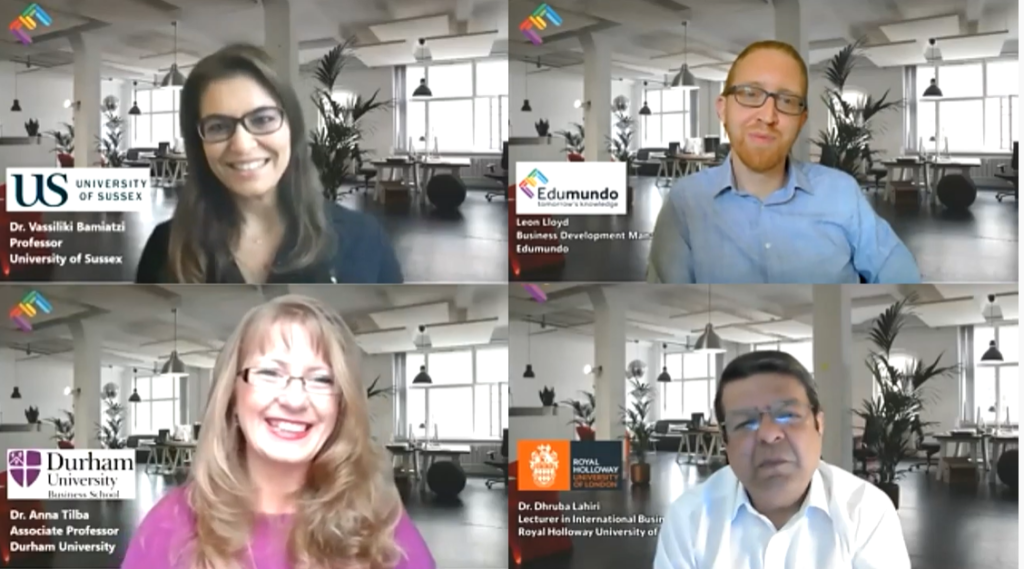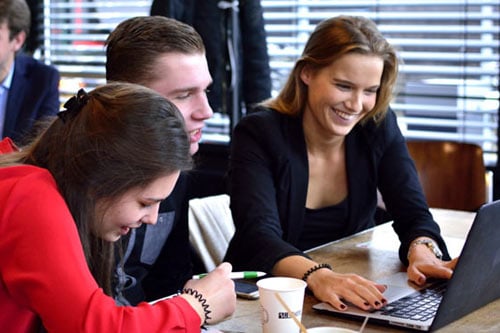
Digital learning provider, Edumundo, recently hosted a webinar on student engagement with an emphasis on experiential learning through management simulations – a type of business game where teams of students manage their own fictional companies and compete to gain market share. The webinar, designed for academic and teaching staff, had over 50 participants in attendance. They were joined by the Business School’s Prof. Vasiliki Bamiatzi, Durham University’s Dr. Anna Tilba, and Dr. Dhruba Lahiri from Royal Holloway University of London.
Here we recap on their approaches to improve student engagement, the challenges of a competitive simulation environment, and how management simulations feature within module assessment.
The panel discussed the use of case studies and management simulations but identified a key benefit of the latter: its ability to foster student-led learning. Vassiliki expanded on this: “It’s active learning, it’s putting students into the shoes of managers. Many use case studies but they’re not as engaging because students cannot grasp all of the information nor how they interpret the case. In simulations, students have this accessibility.”
Another way of incentivising student engagement is to identify areas where students need to improve, as Dhruba explained:
“The simulation inter-links different subjects, exposes students to what they don’t know about managing the business and highlights any gaps in their knowledge.”

One participant asked about the competitive environment of management simulations and whether this hindered students’ engagement with them. This was Anna’s take:
“We’re trying to train and prepare students for the real world. In the real world we have to work with different people…it’s also a journey for students to learn more about who they are. Those who are not as competitive could be really good at other areas such as data analysis and finance.”
Vassiliki also expanded on her approach in role delegation:
“I provide students with a role-making task in the beginning to see what personality traits they have and they decide upon their role within the simulation accordingly.”
The panel also explored how the simulation was assessed on their modules. Anna explained:
“I assess students on their reflection of understanding, in connecting theory to practice. Students who do really badly [on the simulation] still write top-class assignments.”
It’s a similar approach for Dhruba and Vassiliki, with both utilising group assignments, as well as individual reports.
The webinar culminated with a lively ‘Recap and Q&A’ session. As one participant remarked:
“That was really interesting. It’s been really helpful in terms of assessment. I wonder if it is possible to create a community or discussion board for educators using the Edumundo simulations so we can share ideas?”
This idea has been followed up by Edumundo whilst many participants are now exploring the use of management simulations in their modules.
Overall, a highly interesting and informative session thanks to the contributions of all in attendance on the day.
Contact
Over ons
Ons team
Vacatures
Auteur worden
Jan van Nassaustraat 113
2596 BS Den Haag
070-3600510
Stay up to date with our latest updates
We regularly publish and launch new titles and innovative learning products. Want to stay informed about the latest developments? Sign up for our newsletter.
 Een businessgame
Een businessgame Een Edubook
Een Edubook
vraag ontvangen
We hebben uw vraag ontvangen en we zullen op werkdagen binnen 24 uur bij u terugkomen.